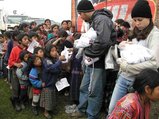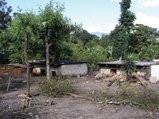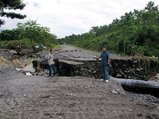


During the first week of October 2005, southern Mexico and most of Central America, including Guatemala, were ravaged by Hurricane Stan. The high winds, flash floods, landslides, and overflowing rivers caused widespread damage throughout the region and resulted in thousands of people dead or missing and hundreds of thousands displaced.
In Guatemala alone, more than 650 people were reported dead and 475,000 were displaced by the hurricane, which was estimated to have caused more damage than Hurricane Mitch in 1998.
The first lady of Guatemala and her organization Secretaria de Obras Sociales de la Esposa del Presidente (SOSEP) began collecting food, water, and clothing in Guatemala City to be transported to the parts of the country that were worst hit. They sent out a national request for help, and hundreds joined the relief effort by donating needed supplies and volunteering their time to sort and pack the many thousands of bags of dry goods.
Teams from the Family International were able to help in many ways, transporting food, shoveling mud out of schools and houses, organizing the collection and distribution of aid in different cities, and more. The following is a report of just one of the many trips we made to villages in the area, including Solola, Santiago de Attilan, San Lucas Toliman, San Lorenzo, Pastores, and Panabaj.
As soon as we found out the extent of the damage, we went to the military base where the supplies were being collected to offer our help. We were told that although they still needed help sorting bags and collecting food from supermarkets, the most desperate need was for large trucks to carry the supplies to the disaster zones. Upon hearing that, we contacted one of our friends who has a large truck, explained the situation, and asked to borrow the truck for a few days. He responded that in addition to loaning us the truck, he would also like to personally come along to help. Gasoline is very expensive here, but the owner of a gasoline station donated some for this trip.
Early the next day our friend met us at the military base with his truck. Two days earlier, armed robbers had hijacked two trucks full of goods, so now the aid organizers were only sending out trucks in convoys of four or five, with one soldier per truck. They grouped us with three other panel trucks and told us to wait our turn.
Because of the general disorder and lack of organization, we ended up waiting until the late afternoon before we were finally cleared to leave. As we waited, we helped to load some of the other trucks that had arrived, and we got a chance to talk to the people in charge of the operation. As soon as they found out that we had experience in disaster relief, they put us in charge of one of the loading docks and told us to gather as many people as we needed to help get things organized.
Finally we loaded the trucks for our own convoy and prepared them to leave. We were put in charge of our convoy, which consisted of four large panel trucks and our small SUV.
After about three hours of driving through the mountains, we arrived at the turnoff that led to the village we had been sent to. There we were told that there had been a mudslide earlier that day, which had taken out a portion of the road. There was no way to pass, and it was already dark. We phoned the office, and they told us to go to another town an hour away and unload the trucks there, but by then it was quite late and the warehouse where we were to unload was closed.
We spent the night at an indoor basketball court that had been turned into a shelter for the soldiers who were helping with the disaster relief, and were thankful for a mattress and a blanket each, and a few hours of sleep.
The next morning we were awakened early with cups of coffee and sent to the warehouse to unload our trucks. It turned out that there were quite a few other trucks ahead of us, so some of us helped unload them while others of us passed out tracts to encourage the soldiers who were on their breaks.
After we were done, one of the officers asked us to take a hundred bags of clothing to one of the villages on the way out. We got to the drop-off point and were faced with desperate people from three different villages, who immediately started arguing and fighting over the clothes. We organized them into groups and then turned to passing out the much-needed blankets, jackets, and socks. By then we were very thankful for the soldiers who had come, as they helped keep things under control.
We arrived home exhausted but safe later that evening, and after a short rest began planning our next trip.
Originally Published in 2006.